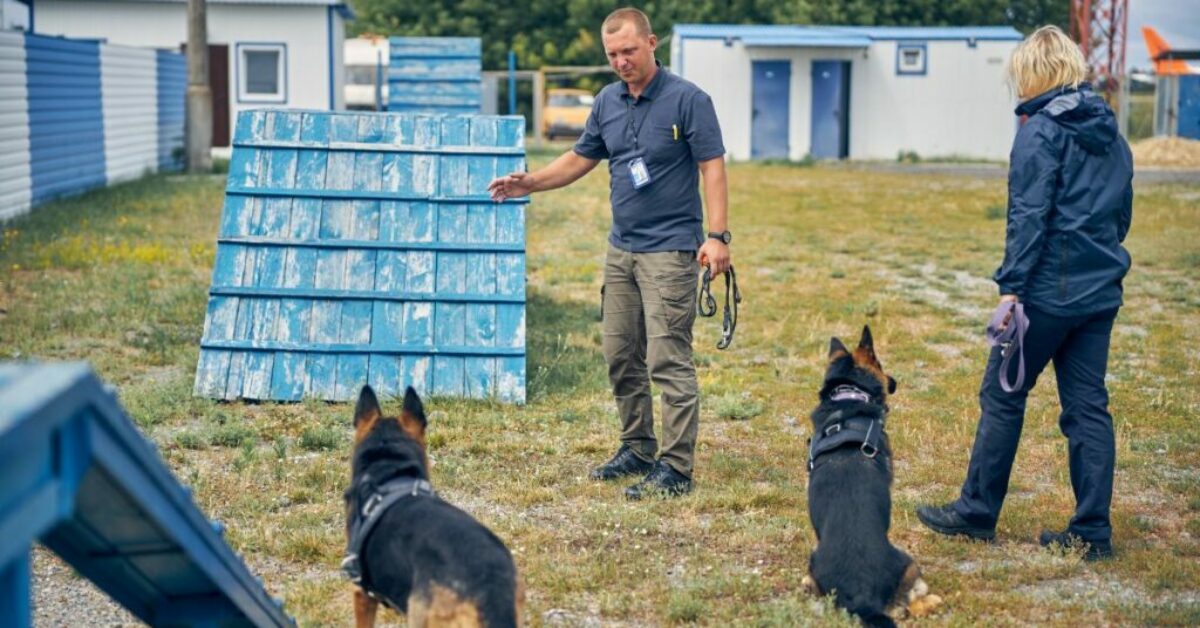How To Become A Police Dog Trainer?
If you love dogs and have an interest in law enforcement, a career as a police dog trainer might be of great interest to you. Police dog trainers are responsible for selecting, training, and maintaining canines for use in law enforcement activities. In this article, we will explore the steps to becoming a police dog trainer, the skills needed to excel in this profession, and the benefits of working as a police dog trainer.
Steps To Becoming A Police Dog Trainer
Becoming a police dog trainer requires a combination of education, training, and experience. Here are the steps to follow:
- Get your high school diploma or equivalent:
First and foremost, you need a high school diploma or GED equivalency to apply for most law enforcement and animal training programs. Ensure you take courses in animal science, biology, math, and any other related subject that’ll prepare you for training dogs and working in law enforcement.Having a strong educational foundation in these subjects is essential to understanding the complexities of dog behavior and effective training techniques. It will also help you communicate with other law enforcement professionals and understand the legal aspects of working in this field.
- Gain experience working with dogs:
Volunteering at animal shelters, offering to walk your neighbors’ dogs for free, or working with a local dog training club is an excellent way to gain hands-on experience in dog training, handling, and behavior.Working with a variety of dogs with different temperaments, breeds, and backgrounds will help you develop the skills needed to train police dogs effectively. You will also learn how to read dog body language and understand their behavior, which is crucial in training them for police work.
You can start by volunteering at a local animal shelter, such as through the American Society for the Prevention of Cruelty to Animals (ASPCA), or explore volunteer opportunities with Best Friends Animal Society, both of which are well-respected organizations in the USA. - Complete a dog training program:
Several schools and institutions offer dog training programs online and on-campus, which also include specialized training for service dogs. These programs cover dog anatomy, behavior, and training techniques specific to law enforcement or related work. Completing a dog training program will give you a comprehensive understanding of dog behavior and the latest training techniques. It will also provide you with the skills needed to train police dogs effectively and ensure their safety during training and on the job.
For example, The Academy for Dog Trainers (ADT) offers comprehensive online programs for those looking to build a career in dog training.
You can also explore specialized courses in police K-9 training through organizations such as the National K-9 Learning Center. - Pass physical fitness requirements:
Police dog trainers must remain fit to keep up with their dogs and various job requirements. You need to meet the physical health requirements of your department and maintain a healthy lifestyle and exercise regularly.Being physically fit is essential in this profession as you will need to keep up with your dog’s physical demands, such as running, jumping, and climbing. It will also help you stay alert and focused during long hours of training and on the job.
For guidelines on fitness standards used by many law enforcement agencies in the USA, check out the Mountain Tactical Institute (MTI) K9 Handler Fitness Assessment or the Federal Law Enforcement Training Centers (FLETC) Physical Efficiency Battery. - Apply to a police department for a job:
Once you have the relevant training and required experience, you can apply to work in a police department that requires K-9 units. Candidates usually undergo multiple stages of testing and interviews before getting accepted. Working as a police dog trainer is a challenging but rewarding career. You will be responsible for training and handling police dogs, which play a critical role in law enforcement. Your job will involve working closely with other law enforcement professionals, and you will be required to maintain the highest level of professionalism and ethics at all times.
Skills Needed For Becoming A Police Dog Trainer
Police dog trainers require specific sets of physical and soft skills to excel in this profession. Here are some of them:
- Excellent communication skills: As a trainer, you need to communicate effectively with police officers responsible for handling the dog you’ll train and the dog itself. Clear communication ensures that the dog performs well in various duties. Communication is also essential when dealing with dog owners, who may need guidance on how to handle their dogs.
- Patience: You must have a high level of patience when training dogs since they are intelligent creatures but require a lot of time to learn and understand specific commands. It may take several weeks or even months to train a police dog to perform specific duties, and patience is vital in this process.
- Detail-oriented: In this profession, being detail-oriented is crucial. You’ll need to provide accurate training and maintenance records and track the progress of the dog’s training. You must also pay close attention to the dog’s behavior and body language to identify any issues that may affect its performance.
- Self-Discipline: Police dog trainers need to be self-disciplined since they need to work with dogs in adverse and stressful situations that require them to remain composed and focused. Self-discipline is also crucial when it comes to following safety protocols and maintaining professional standards.
- Energy: This profession requires trainers to have stamina, agility, and energy needed to keep up with dogs during training and work and handling adverse situations that need quick responses. You must also be physically fit to handle dogs of different sizes and breeds.
Aside from these skills, police dog trainers must also have a deep understanding of dog behavior and psychology. They must be able to read a dog’s body language and understand its instincts to train it effectively. Additionally, trainers must keep up with the latest developments in dog training techniques and technology to provide the best training possible. For more industry news and techniques, you can attend the IAABC Annual Conferences or read magazines like K9 Cop Magazine.
Police dog trainers must also have a passion for working with dogs. It is a challenging profession that requires a lot of hard work and dedication. However, the rewards of seeing a well-trained police dog in action are immeasurable. A police dog trainer’s job is not just about training dogs but also about building a strong bond with them that will last a lifetime.
What is A Police Dog Trainer?
A police dog trainer is a highly skilled professional who is responsible for training and handling dogs for various law enforcement-related duties. These dogs are specially trained to assist police officers in their daily tasks and are an essential part of the law enforcement team.
Police dog trainers work with a variety of breeds, including German Shepherds, Labrador Retrievers, and Belgian Malinois. They are responsible for selecting the right breed of dog for the job and ensuring that the dog is trained to meet the specific needs of the police force.
Training a police dog is a complex process that requires a deep understanding of the dog’s psychology and behavior. It involves teaching the dog to obey commands, such as sit, stay, and come, as well as more advanced skills, such as tracking, searching, and apprehending suspects.
Police dog trainers must be physically and mentally fit to handle the demands of the job. They need to be able to run, jump, and climb, as well as have the strength to control a large and powerful dog. They also need to have excellent communication skills to work effectively with their canine partners.
In addition to training the dogs, police dog trainers are also responsible for keeping detailed records of their training and performance. This includes maintaining records of the dog’s health, training progress, and performance in the field.
Overall, police dog trainers play a crucial role in law enforcement, helping to keep our communities safe and secure. Their dedication and hard work are essential in ensuring that police dogs are well-trained and ready to serve when called upon.
The Benefits of Working as A Police Dog Trainer
Like any other profession, there are benefits of working as a police dog trainer. Here are some:
- Rewarding:
Being a police dog trainer is a fulfilling and rewarding profession that entails training and caring for dogs that serve valuable services to law enforcement agencies and communities. As a police dog trainer, you will have the opportunity to work with highly intelligent and trained animals that are capable of a wide range of tasks, such as detecting explosives, tracking suspects, and apprehending criminals. The bond you develop with these dogs is a special one, and the satisfaction of seeing them excel in their work is immeasurable.
- Job security:
Police dog training jobs are highly competitive, but once you land one, job security is relatively high since police departments, and K-9 units are always in need of trained officers and dogs that assist in their everyday work. With the increasing need for security and law enforcement, the demand for police dog trainers is expected to grow in the coming years, making it a stable career choice.
- Good pay:
Police dog trainers receive good compensation packages compared to other animal training professions. Pay scales vary depending on experience and department of service. According to ZipRecruiter, the average salary in the United States is around $56,233/year as of October 2024. However, on average, police dog trainers earn a salary of around $50,000 to $70,000 per year, with the potential for overtime pay and bonuses. This makes it a lucrative career choice for those who are passionate about working with animals and law enforcement.
- Health benefits:
Many organizations offer health benefits such as medical, dental, and vision care to their employees, including police dog trainers. This ensures that you and your family are covered in case of any medical emergencies or routine check-ups. Additionally, some departments may offer retirement plans, life insurance, and other benefits that make it a stable and secure career choice.
- Opportunity for advancement:
With time, experience, and additional training, a police dog trainer can advance to other roles such as supervisor or manager in their field. Some trainers may also choose to specialize in a particular area, such as narcotics detection or search and rescue, which can lead to higher pay and more specialized job opportunities. Additionally, working as a police dog trainer can open doors to other law enforcement careers, such as becoming a K-9 officer or detective.
Becoming a police dog trainer is a rigorous and demanding profession that requires dedication, patience, and hard work. If you’re passionate about working with dogs and law enforcement, it might be the perfect career for you. Consider the steps to follow, gain the required skills, and enjoy the rewards of this profession, including good pay, job security, and high job satisfaction.




